Democratic Norms, Executive Branch
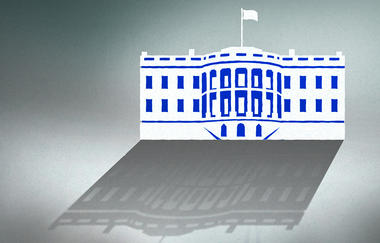
This Democracy Fund Voter Study Group Brief will examine how the public thinks about the relationship between presidential authority and three specific checks on his power: the Congress, the courts, and the press. It builds on our recent report that sought to understand authoritarian sympathies among the American public, called “Follow the Leader: Exploring American Support for Democracy and Authoritarianism.”
“Follow the Leader” found that while the vast majority of Americans support our democratic political system, a substantial portion of the public have at least some doubts about democracy with about a quarter expressing at least some explicit support for an authoritarian alternative. Further, the report found that support for authoritarian leadership tends to come from those who are disaffected, disengaged from politics, distrustful of experts, culturally conservative, and have negative views toward racial minorities.
“Follow the Leader” was based on the July 2017 VOTER Survey (Views of the Electorate Research Survey) from the Democracy Fund Voter Study Group, which included a battery of questions about checks on presidential authority.1 Specifically, the survey introduced a series of binary statements, asking respondents whether the president should be constrained by or subject to oversight from the law/courts, the Congress, or the media.
Which of these two statements come closer to your view?
| Law/Courts |
|
| Congress |
|
| Media |
|
1 The July 2017 Democracy Fund Voter Study Group VOTER Survey interviewed a group of 5,000 Americans who were part of a longitudinal panel that has been reinterviewed several times since 2011 by the survey research firm YouGov.
Rule of Law: Ninety-one percent of respondents agreed that “the president must always obey the laws and the courts, even if he thinks they are wrong.” By contrast, just 9 percent said that the president “should not be bound by laws or court decisions that he thinks are wrong.”
Congressional Oversight: Eighty-one percent of respondents say that “members of Congress should provide oversight of the president and executive branch, even if the president is in their same party.” The remaining 19 percent say that “members of Congress should give the president freedom to make the decisions he feels are right for the country.”
Media Scrutiny: Seventy-five percent of respondents said that “the news media should scrutinize the president and other politicians to ensure they are accountable to the American people.” By contrast, 25 percent chose the other option: “The news media should allow the president and politicians to make decisions without being constantly monitored.”
Thirty-six percent of those who had favorable impressions of President Trump when the VOTER Survey was conducted in July do not support congressional oversight, and almost half do not support media scrutiny. (Fewer of those who have a favorable view of Trump oppose rule of law at 15 percent.) In contrast, those who have unfavorable views about President Trump overwhelmingly support oversight and media scrutiny of the president and politicians.
Figure 1
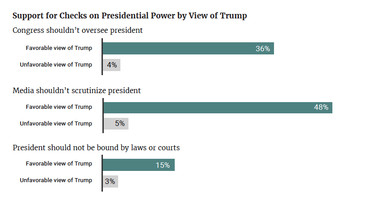
Support for checks on presidential power decrease further among those who are “very favorable” to President Trump. Most notably, strong Trump supporters are 18 points less supportive of congressional oversight than those who have a somewhat favorable opinion of him (43 percent compared to 25 percent). Similarly, those with the most unfavorable ratings of Trump are the strongest supporters of checks and balances.
Figure 2
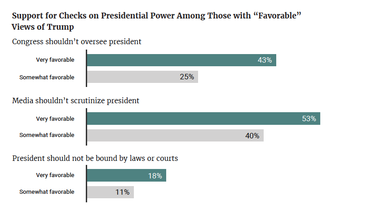
Notably, Republicans who did not vote for Donald Trump in the 2016 primary were significantly more supportive of oversight and accountability of a president. For example, while 18 percent of Trump primary voters said that the president should not be bound by the rule of law, only 6 percent of Cruz voters, 3 percent of Rubio voters, and 2 percent of Kasich voters felt the same way. Similarly, while 52 percent of Trump primary voters opposed media scrutiny, only 29 percent of Cruz supporters, 26 percent of Rubio supporters, and 22 percent of Kasich supporters said that the media should allow the president to make decisions without being constantly monitored.
To understand what factors may shape whether those who have a favorable view of President Trump are more or less supportive of checks and balances, we tested those factors that we previously found to be most closely associated with authoritarian attitudes in our earlier “Follow the Leader” report.
Education:Among Trump supporters, higher levels of education correspond to more support for democratic norms. Noncollege-educated Trump supporters are more likely to disregard checks and balances. Still, a surprising number of college-educated Trump supporters (37 percent) oppose media scrutiny.
Figure 3
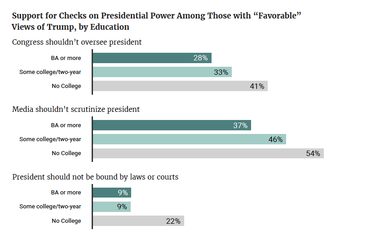
Figure 4
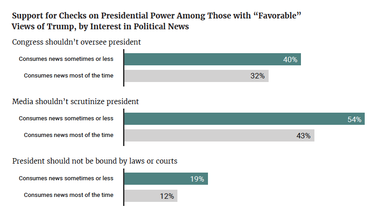
Although Trump supporters who express doubts about our democracy or openness to authoritarian alternatives are more likely to oppose checks on the president’s authority, there is a silver lining: many of these seemingly anti-democratic Trump supporters still support some limits on presidential power.
Satisfaction with Democracy: Among Trump supporters who say they are not satisfied with our democracy, 57 percent support congressional oversight (compared to 68 percent among Trump supporters who are satisfied), 44 percent support media scrutiny (compared to 56 percent among the satisfied), and 79 percent say the president should be bound by the law (compared to 88 percent among the satisfied).
Preference for Democracy:Among Trump supporters who say that democracy is not the best system under all circumstances or who say they have no preference for democracy, 53 percent support congressional oversight (compared to 68 percent among Trump supporters who always prefer democracy), 39 percent support media scrutiny (as compared to 57 percent among those who prefer democracy), and 72 percent say the president should be bound by the law (as compared to 89 percent among those who prefer democracy).
Strong Leader: Even among Trump supporters who prefer a political system in which a strong leader doesn’t have to bother with Congress or elections, 45 percent support congressional oversight (as compared to 73 percent among Trump supporters who oppose a “strong leader”), 33 percent support media scrutiny (as compared to 61 percent among those who oppose a “strong leader”), and 69 percent say the president should be bound by the laws (compared to 92 percent among those who oppose a “strong leader”). These numbers show mixed support for American democratic norms of checks and balances even among many of those who endorse an authoritarian alternative to democracy.
The July 2017 VOTER Survey also asked respondents how much responsibility various actors had for “how things have gone.” On balance, respondents held Trump himself and Republicans in Congress most responsible, but also gave some blame to the news media, Democrats in Congress, and the courts.
Table 1
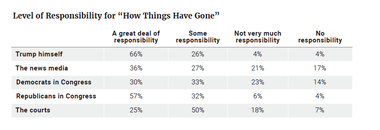
However, those who are favorable to Trump and not favorable to Trump allocate responsibility differently. Not surprisingly, Trump’s supporters are much more likely to assign a “great deal” of responsibility to the media (52 percent), Democrats (47 percent), and the courts (34 percent) than those who viewed Trump unfavorably, while those who hold an unfavorable view of Trump (mostly Democrats) are more likely to blame Trump himself (79 percent) and Republicans in Congress (66 percent) than those who viewed Trump favorably. Interestingly, more than half of Trump supporters (51 percent) say that Trump himself deserves a great deal of responsibility for how things are going.
Table 2
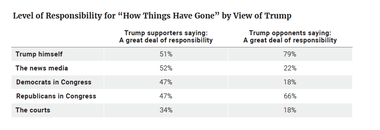
However, whether Trump supporters hold the media responsible seems to have no relation to whether or not they think the media should scrutinize the president. Interestingly, although 46 percent of Trump supporters who hold the media very responsible say the media shouldn’t scrutinize the president, 50 percent of Trump supporters who hold the media somewhat or not responsible say the media shouldn’t scrutinize the president.
Similarly, of those Trump supporters who blame the courts, only 17 percent say the president should not be bound by the laws, as compared to 13 percent of those Trump supporters who don’t blame the courts.
In short, Trump supporters’ beliefs about the media and the courts’ responsibility for “how things have gone” is unrelated to how they feel about the role those institutions play in our democratic system.
Our “Follow the Leader” report on authoritarian attitudes among the public found that the vast majority of Americans support our democracy. Similarly, we find in this Democracy Fund Voter Study Group brief that most people believe in checks on the president’s authority — though the proportion of people opposed to media scrutiny (25 percent) is worrisome on its face. Even among partisan supporters of President Trump who have expressed doubts about our democracy, many continue to support important checks on executive authority.
Nevertheless, it is concerning that such a significant portion of the president’s supporters reject traditional American democratic norms of a free press and congressional oversight. At a time when many have expressed concern about the president’s attitude toward independent checks on his authority, a notable percentage of the president’s supporters seem to be comfortable with fewer limits on presidential power.
The low support for a robust fourth estate among the president’s supporters (about half say the press should not scrutinize the president) is most troubling. Unfortunately, we do not have historical data on these attitudes, so we hesitate to say for sure whether Trump’s rhetoric has provoked these attitudes, or whether they are unique to this particular moment. Many of President Obama’s supporters were certainly comfortable with his expansive use of executive orders and decried media coverage from conservative outlets like Fox News. But it is our strong hunch that the anti-media scrutiny numbers are considerably higher for President Trump because he has uniquely attacked the media and American political institutions more broadly.
Further research will tell us more about the degree to which these attitudes are transitory or whether they are a more permanent aspect of our political landscape. However, we do take heart in the fact that, even among those most strongly favorable to President Trump, solid majorities support the role of the Congress and judiciary in overseeing and checking presidential power.
Subscribe to our mailing list for updates on new reports, survey data releases, and other upcoming events.